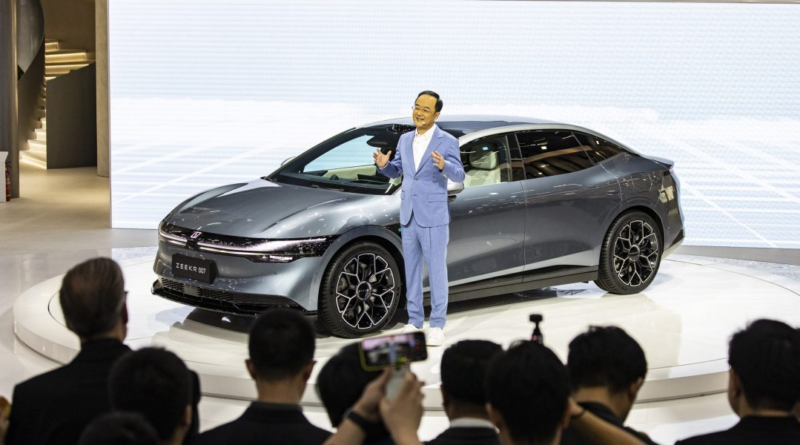Chinese EV maker Zeekr is making inroads into Wall Street—it’s now listed on the New York Stock Exchange, and traders are piling in
Chinese EV manufacturer Zeekr beat a choppy IPO market and concerns about EV demand with a strong debut on the New York Stock Exchange this past Friday, surging to a $6.8 billion valuation after traders pushed its stock 35% above its initial asking price by the end of the day.
Zeekr is one of a number of Chinese EV brands—its peers include BYD, smartphone-turned-car company Xiaomi, and Zeekr’s parent company, Geely Auto—that have made a splash off the back of huge investments in electric vehicles, which have taken the Chinese market by storm and sent regulators in the U.S. and Europe scrambling to protect their domestic automakers from a wave of Chinese imports.
Zeekr isn’t the first major Chinese EV maker to be listed in the U.S. A few of its smaller competitors, such as NIO, XPeng, and Li Auto, have traded on U.S. exchanges since as far back as 2018. But Zeekr’s impressive debut coincides with growing recognition of China’s dominance in the EV sector and the possibility of a looming trade war: The Biden administration is reportedly planning on taxing Chinese EV imports by as much as 100%, four times the current rate.
But any tariff hike would have little immediate impact on American consumers. Currently, no Chinese EV manufacturers sell cars in the U.S., and a Geely spokesperson told InsideEVs that Zeekr is looking at the U.S. market but not yet committing to passenger vehicle sales.
The Zeekr brand is owned by Geely Auto, a Hangzhou-based company with longstanding ties to Volvo that’s become China’s second-biggest carmaker. Unlike competitors including BYD, which have eaten up market share in China by selling vehicles for as low as $10,000, Zeekr sells luxury vehicles at a higher price point, according to its prospectus filed with the SEC. Some of its most popular models include the ZEEKR 001, a five-seat hatchback that sells for around $55,000 in Europe, and the ZEEKR X, a luxury SUV that retails for a similar cost.
“If you look at the big picture, the market [in China] is very, very crowded,” Zeekr CFO Yuan Jing told CNBC following the IPO on Friday. “But if you zoom in a little bit and you look at each of the market’s price brackets, there’s definitely an opening for the more premium market segments.”
After an ice-cold IPO market in 2022 and 2023, Zeekr is riding a wave of investor interest in new listings that’s resulted in strong valuations for companies like Reddit, cruise operator Viking, and data startup Rubrik. Zeekr’s initial share pricing made it the biggest U.S. IPO for a Chinese company since 2021.
Zeekr’s growth prospects could be hampered by trade policies in the U.S. and Europe. As the Chinese market has become more saturated and demand has softened, its EV makers have increasingly turned to overseas markets to keep sales up. Southeast Asia has emerged as a key growth area, but politicians in the U.S. and Europe have vowed stiff tariffs if Chinese vehicles threaten to undercut domestically produced cars. The Biden administration is reportedly on the verge of quadrupling taxes on imported Chinese EVs, which would more than double their final price and make it harder to compete with more expensive offerings from companies such as Ford, GM, and Stellantis.
But since no Chinese EVs are currently available to American consumers, Biden’s likely tariff hike is more symbolic than practical. And even before news of the tariffs, Chinese automakers like BYD said they don’t plan to sell in the U.S.
Last week, Stella Li, CEO of BYD Americas, said that “the U.S. is no longer … like an open market,” citing protectionist trade policies like tariffs. “The U.S. is becoming a very protective market….We do not have plans to sell in the U.S.”
But aggressive U.S. trade policy against Zeekr and its peers coupled with the possibility of similar strategies in Europe knock any global ambitions Zeekr might have, meaning investors are likely considering the stock more as a play on EV demand in China and East Asia, where Zeekr already has a strong foothold.
If Zeekr’s stock price is any indicator, investors don’t seem too concerned about Zeekr’s lack of American market share. The stock peaked as high as $32 per share on Monday, up over 50% from the initial IPO pricing and implying a market cap of over $7 billion. That’s well behind many of its competitors—even after a brutal year for its stock, Tesla is still valued at well over $500 billion—but it’s still a strong sign for Zeekr and investor interest in Chinese EVs generally.



